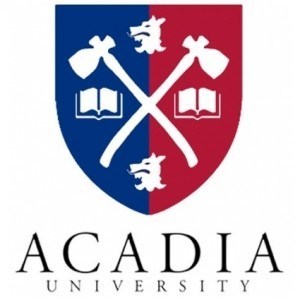Photos of university / #acadiau
The Bachelor of Arts in Economics with Mathematics at Acadia University offers students a comprehensive and rigorous education designed to provide a strong foundation in economic theory, quantitative analysis, and mathematical skills. This interdisciplinary program aims to prepare students for diverse career paths, including finance, government, research, and further academic pursuits. Throughout the program, students will engage with core economic concepts such as microeconomics, macroeconomics, econometrics, and development economics, while simultaneously honing their mathematical abilities through calculus, linear algebra, probability, and statistical methods. This dual focus ensures graduates are equipped to analyze complex economic phenomena quantitatively and develop evidence-based solutions to real-world problems.
The program is structured to foster critical thinking, analytical skills, and data literacy necessary for success in today’s data-driven economy. Students have the opportunity to participate in internships, research projects, and seminars that connect academic concepts with practical applications. With small class sizes and dedicated faculty, students receive personalized guidance and mentorship throughout their studies. The curriculum emphasizes not only theoretical understanding but also practical skills such as data analysis, mathematical modeling, and economic forecasting, which are highly valued by employers and graduate programs alike.
Graduates of the Economics with Mathematics program will be prepared for careers in economic analysis, consulting, policy development, banking, and beyond. They will also have the necessary skills for graduate study in economics, business, or related fields. Acadia University’s supportive learning environment, combined with a strong emphasis on quantitative methods, makes this program an excellent choice for students interested in combining economic theory with advanced mathematical techniques. Upon completion, students will be well-positioned to contribute to solving complex economic issues through rigorous analysis, innovative thinking, and effective communication.
The Economics with Mathematics undergraduate program at Acadia University offers students a comprehensive education that combines core economic principles with rigorous mathematical training. This multidisciplinary program is designed to equip students with the analytical and quantitative skills necessary to understand and interpret complex economic data, develop models, and make informed decisions in various economic contexts. The curriculum provides a balanced mix of theoretical foundations and practical applications, enabling graduates to pursue careers in government, finance, research, policy analysis, and academia.
Throughout the program, students will explore fundamental topics such as microeconomics, macroeconomics, econometrics, and mathematical methods for economists. Emphasis is placed on developing strong problem-solving skills, statistical proficiency, and mathematical modeling capabilities. The coursework includes advanced calculus, linear algebra, probability theory, and statistical inference, all tailored to enhance economic analysis. Students are also introduced to programming languages and software commonly used in economic research, such as R and Stata, preparing them for data-driven decision-making in professional environments.
In addition to core courses, students have the opportunity to engage in specialized electives that suit their career interests, including financial economics, economic development, environmental economics, and public policy. The program encourages active participation in research projects, internships, and seminars, fostering practical experience and professional networking. Small class sizes and dedicated faculty mentorship ensure personalized academic support and guidance.
Graduates of the Economics with Mathematics program will possess a versatile skill set applicable to diverse sectors and will be well-prepared for graduate studies or professional certifications in economics, finance, or related fields. The program’s combination of rigorous mathematical training and economic theory positions students to become analytical thinkers capable of addressing real-world economic challenges with innovative solutions.
Required Courses in Economics with Mathematics program at Acadia University typically include foundational courses such as Principles of Economics (Micro and Macro), Introduction to Mathematics for Economics, Intermediate Microeconomics and Macroeconomics, and Calculus for Economics. Students are also required to complete courses in Probability and Statistics, Mathematical Methods for Economics, and Data Analysis, which develop analytical and quantitative skills essential for economic analysis. Advanced coursework may include Econometrics, Public Economics, International Economics, and Development Economics, allowing students to specialize and deepen their understanding of specific areas within economics. To ensure well-rounded academic preparation, students often take complementary courses in related fields such as Political Science, Accounting, and Business. The program generally emphasizes the application of mathematical tools to economic theory, requiring students to complete coursework that integrates mathematical modeling, problem-solving, and empirical research techniques. In addition to coursework, students are usually encouraged or required to participate in research projects, internships, or co-op placements, providing practical experience in economic analysis and policy formulation. Elective courses offer opportunities to explore specialized topics like Environmental Economics, Health Economics, or Financial Markets. Overall, the program aims to equip students with a rigorous understanding of economic principles alongside advanced mathematical skills, preparing them for careers in academia, government, or the private sector, as well as graduate studies in economics or related disciplines. The total credit requirements typically exceed 40 courses or equivalent units, distributed across core, elective, and capstone components to ensure comprehensive training and skill development.
The Bachelor of Economics with Mathematics at Acadia University offers students various financing options to support their educational journey. Tuition fees for the program are structured to ensure accessibility and are comparable to other undergraduate programs at the university. International students are subject to different fee schedules compared to domestic students, with specific details available on the university's official website. Acadia University provides a range of scholarships and bursaries designed to assist students financially, including merit-based awards, need-based bursaries, and specialized scholarships for students excelling in mathematics and economics. These scholarships are competitive and require application through the university's scholarship portal, often considering academic achievements, extracurricular involvement, and financial need. Additionally, students can explore federal and provincial financial aid options, such as government student loans and grants, which are available to eligible Canadian citizens and permanent residents. Work-study programs are also available, allowing students to gain work experience on campus while earning additional income to offset tuition and living costs. Acadia University also encourages students to seek external funding opportunities, including private scholarships from foundations, corporations, and community organizations. The university's financial services office provides counseling and assistance to help students navigate their financing options, apply for available aid, and manage their budgets throughout their studies. The cost of living in Wolfville, where Acadia University is located, is generally moderate, and students are advised to plan their finances accordingly. International students are often required to demonstrate proof of financial support when applying for visas, emphasizing the importance of securing adequate funding before arrival. In summary, Acadia University offers comprehensive financial support options for students enrolled in the Economics with Mathematics program, including scholarships, bursaries, government aid, work opportunities, and external funding sources. Prospective students are encouraged to review the official university resources and participate in informational sessions to maximize their financial planning and support options.
The Bachelor of Arts (BA) in Economics with Mathematics at Acadia University offers students a comprehensive understanding of economic theories, principles, and quantitative analysis techniques. This interdisciplinary program is designed to equip students with critical thinking, analytical skills, and a solid foundation in both economics and mathematics. The curriculum includes core courses in microeconomics and macroeconomics, along with advanced mathematics courses such as calculus, linear algebra, and statistics, which are essential for economic modeling and data analysis. The program aims to prepare graduates for diverse career paths, including finance, government, research, and further academic pursuits. Students benefit from small class sizes, personalized instruction, and opportunities for research projects and internships, fostering a practical understanding of economic applications. Acadia University's faculty members bring extensive research and teaching experience, providing mentorship and guidance throughout the degree. The program emphasizes not only theoretical knowledge but also real-world problem-solving skills, incorporating case studies and contemporary economic issues. Additionally, students are encouraged to develop strong quantitative skills that complement economic analysis, making them competitive in data-driven roles. Graduation from this program opens doors to graduate studies in economics, business, and related fields, or directly entering the workforce in positions requiring analytical expertise. The university’s vibrant campus community and commitment to student success contribute to an enriching academic environment. Overall, the Economics with Mathematics program at Acadia University offers a rigorous and well-rounded education designed to prepare students for successful careers and lifelong learning in a global economic context.


